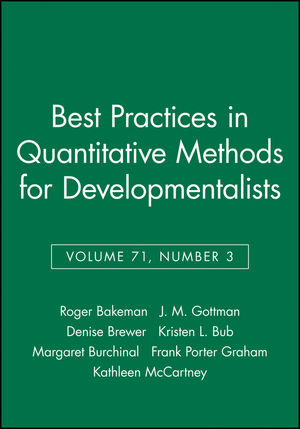Best Practices in Quantitative Methods for Developmentalists, Volume 71, Number 3ISBN: 978-1-4051-6941-7
Paperback
172 pages
November 2006, Wiley-Blackwell
 |
||||||
The role of quantitative methods in testing developmental hypotheses is widely recognized, yet even very experienced quantitative researchers often lack the knowledge required for good decision-making on methodology. The end result is a disconnect between research and practice in methods. The purpose of this monograph is to fill a gap in the literature by offering a series of overviews on common data-analytic issues of particular interest to researchers in child development. Our hope is that this monograph will make already developed methods accessible to developmentalists so they can understand and use them in their research. We start at the beginning with chapters on data management and measurement, two neglected topics in methods training despite the fact that every investigation should begin with proper consideration of each. We follow with two important topics for developmental research, missing data and growth modeling. Missing data can plague developmental work because participants sometimes miss one or more assessment points. Growth modeling methods offer researchers a true means to assess change over time as compared with cruder methods like difference scores and residualized change scores. Then comes a discussion of mediation and moderation, two tools that can be used to elucidate developmental processes. Because so much developmental science is non-experimental, we include a chapter on selection bias that compares five modeling strategies. Proper attention to data management, measurement, missing data, growth modeling (whenever possible), mediation and moderation, and potential selection bias is guaranteed to result in greater precision in inference-making. Even when researchers make good decisions about methods, it is critical for them to use good judgment about the practical importance of findings, so we conclude with this important discussion. We view this monograph as a first step to getting quantitative researchers started and we believe this reference will help researchers make better-informed decisions about methodology.



